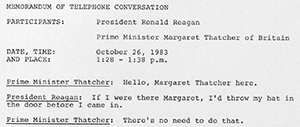Release of the Reagan-Thatcher tapes
For years there have been stories that tapes of some private conversations had survived from the Reagan White House, among them a classified phone call between the President and Margaret Thatcher. Both margaretthatcher.org and Lady Thatcher’s authorized biographer, Charles Moore, have trailed the story and finally, resolved it.
It was true. A box of 20 tapes was released to the public in late Oct 2014 at the Reagan Library in Los Angeles, days before our editor happened to visit.
Among the haul were two Thatcher tapes, released in response to a Mandatory Review request by Daniel Collings, Director of US Research for the biography. One of them addressed the crucial topic of the US invasion of Grenada, the other the call President Reagan made to MT after he received news of the Brighton bomb.
margaretthatcher.org will publish the Reagan tapes in full, with MT the first batch
Why were the tapes made & how did they survive?

At first sight it is surprising that any tapes were made, let alone survived. Watergate taught the White House many lessons, and one of the clearest was this: the tape recorder is not your friend. Nixon’s successor stripped out the semi-automated recording system installed in the Oval Office and other meeting rooms. Why were tapes still being made only a few years later?
The answer is that the NSC staff used them to make accurate paper records of presidential phone conversations, which no one doubted had to be made. Calls were particularly difficult for the notetakers. For one thing, secure communications sometimes affected the audibility of the person on the other end of the line, making some words, particularly names, hard to catch. And the absence of visual cues made it harder still.
There was clearly no intention to keep such tapes: once transcription was complete, the policy was to wipe them by reusing the tapes for the next call. Life being what it is though, a small proportion of recordings survived, probably an entirely random selection. The taping was done in a small communictions centre just outside the White House Situation Room in the basement of the building, and perhaps there was a drawer, a box, a filing cabinet there that became a bit of a dumping ground.
1983 Oct 26: "If I were there Margaret, I'd throw my hat in the door before coming in"
The US transcript of the call has been available since 2000, the briefer British note (probably also made from a recording) since December 2013. The interest of the Grenada tape comes not from new content so much as the fascination of actually hearing the two speaking together in private, catching the tone and some of the nuances.
This was almost certainly an atypical Thatcher-Reagan conversation, in fact among the most difficult they ever had. The key point is that MT did not quite believe what she was being told by the President - that the US had had no opportunity to consult Britain before it made the decision to invade the island. She strongly suspected that the Administration had deliberately kept her in the dark, and she minded that.
But the striking thing is that she chose not to put President Reagan on the spot about it. Her tone is cautious, almost reserved. She says comparatively little. In one of their other difficult calls - when the President rang her on 31 May 1982 to urge a Falklands ceasefire - he barely got a word in. Not this time.
All the same it is hard not to think she made her feelings clear, listening to the tape. Her questions and comments have a critical element to them and by the time she says later in the conversation that "it will be very tricky" one feels it has registered with the President, who has a slightly more defensive air.
Probably anticipating that things might not go altogether well in a call, there was some disagreement in the White House as to whether the President should make it. His National Security Adviser, Bud McFarlane, seems to have been swayed in favour of it by relatively junior colleagues - Peter Sommer and Oliver North - while his deputy John Poindexter and Executive Secretary, Bob Kimmitt argued against. The thinking was to win MT round, because Britain would play "a crucial role" in the post-invasion settlement. Grenada needed an interim government and as a Commonwealth member, Britain would be heavily involved in its formation. Britain's role in the EC was also considered important, because the Community was expected to formulate its policy in line with the interests of the member state most closely interested.
The President spoke fluently and without much briefing. He seems to have chosen the line of argument himself, stressing the suddenness of the situation, the meeting with George Shultz in the middle of the night in Georgia. And he shrewdly played up the fear of a leak, the kind of risk he will have known MT was very conscious of. Whether she entirely understood his opening phrase about throwing his hat in the door is maybe doubtful - it is more an American figure of speech than British. It is hard to believe he will have thought the call 100 per cent successful, but it was surely the right thing in the longer run for their relationship, which steadily grew stronger from this point onwards.
1984 Oct 12: the Brighton Bomb
Later in the day of the Brighton Bomb President Reagan rang MT to express his concern and offer support. The tape released by the Reagan Library largely consists of silence, however, for the simple reason that MT wasn't at her desk when he rang. There is a kind of dark humour to it, as anxious staff at No.10 pop up on the line to make sure he is still there. The tape also ends in mid-flow.
